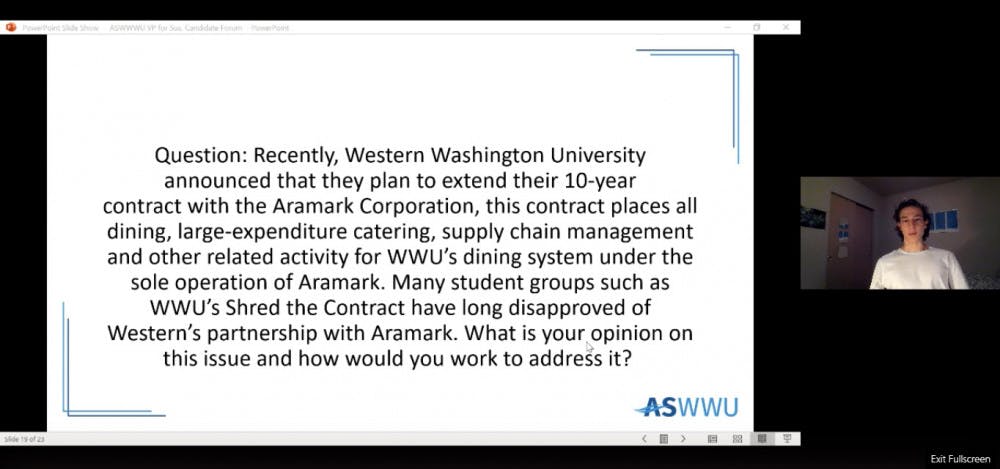Candidates running for the vice president of sustainability position share who they are and what their plans are for Western Washington University

Correction: A previous version of this story stated the ballots were open until Jan. 25. The ballots were open till Jan. 29. The story has been updated to accurately reflect that.
By Alison Ward
Candidates running for the vice president of sustainability position introduced themselves and their proposed agendas with a focus on sustainable and injustice issues, in a candidate forum Monday, Jan. 25.
Mario Alem, the Associated Student election coordinator, began the forum by introducing the six candidates: Western Washington University students Cole Burk, Riley Weeks, Eric Dawson, Zarea Lavalais, Seb Genge and Katie McNabb.
"I have a passion for social sustainability; it is the glue between economic and environmental," said fourth-year anthropology student Zarea Lavalais. Lavalais said she wants to cultivate all parts of the marginalized communities which have been put on the back burner.
Racial inequality and social change were at the forefront of this discussion. In 2016, the Native American Student Union released their demands on what they needed to be met, and on June 19, 2020, the Black Student Organizations (BSO) released their demands.
First-year Riley Weeks, who is studying environmental science and journalism with an emphasis on Native American studies said, the most powerful thing is not just giving communities of color a place at the table, but giving them the head of the table and letting them decide what needs to be done in their communities.
According to the Associated Students, the BSO asked for Western to shred and discontinue the contract with Aramark, create a safe space for Black students, create a diverse range of curriculum authors, rename Huxley College and much more. Each of these demands has been reviewed and seen as crucial points that each candidate wants to initiate.
Seb Genge, a first-year business and sustainability student, agreed with the “Shred the Contract” campaign. "I understand why the university made this decision, but that was based on a complete financial basis, not a value or moral-ethical standpoint,” Genge said.
As an avid hiker, Genge said he intends to advance Western's sustainability goals. He believes fostering respect for our planet while considering the long-term impacts our decisions will have, are essential.
During the discussion, a question was asked about some of the candidates’ white privilege.
“While I am a member of the LGBTQ+ community, I can recognize that I am a white man with a lot of privilege, period,” said Cole Burk, a first-year environmental studies pre-major. “But I can't express enough that sustainability starts with equity. If I was in this position, my job is to listen and to amplify minority student voices, especially within Huxley.”
Along with discussing social change, many of the candidates explained the specific sustainable changes they would make if appointed AS VP.
Burk said, “The biggest thing that all the candidates are here for is genuinely wanting to improve Western,” Burk said. “Being a Western student, you can see a lot of what Western is doing, or, more importantly, hasn’t done.”
A primary concern all the candidates had was keeping clear and robust communication with faculty and students. Burk said speaking with each branch of sustainability at Western around a table once a month, will allow people to come together to work collaboratively.
"I am a passionate environmentalist committed to working tirelessly for environmental and social sustainability for all members of the Western campus," Weeks said as she highlighted her experience as a board member of Ecological Action, a non-profit that partners with underserved communities to create a sustainable future.
Weeks also noted her experience with amplifying diverse voices as she talked about her time installing solar panels with two separate Native American communities in Washington and South Dakota.
"I think that the programs we already have in place for sustainability, especially our transportation are very important programs," said Eric Dawson, a third-year pre-major in urban planning and sustainable development. "I would like to address and possibly push forward some changes based on the BSO document that we as candidates all received."
This being Dawsons' first time running for an Associated Student position, he said the experience of lobbying in Olympia for the school has allowed him to be familiar with the setup of the duties the AS VP will be doing and is dedicated to continuing to work for the student body.
Sustainable solutions mentioned include: alternative transportation, banning plastic on campus and paying attention to where the food at Western is coming from.
Lavalais said, if elected, her focus would be on social sustainability. With the inclusion of the BSO demands, food security and starting an on-campus ban of plastic that is conscious of people with disabilities. “Because the whole point of intersectional environmentalism is to include all and not just one section of a community," Lavalais said.
Alem noted that Katie McNabb is one of the candidates in the running for the AS VP position but was not able to attend the forum due to conflicting scheduling. All candidate statements and photos are available at the Associated Students Review.
“I want to encourage everyone to vote because voting is important, especially from what we have seen from this last election, so make sure your voice is heard," Dawson said. "I want to be able to stand for all students, especially minorities that feel like their voices have not been heard, and I want more transparency and more interaction between AS and the student body."
Alem ended the forum by thanking the candidates and reminding students that ballots are open online at the Western Involvement Network until Friday, Jan. 29.





